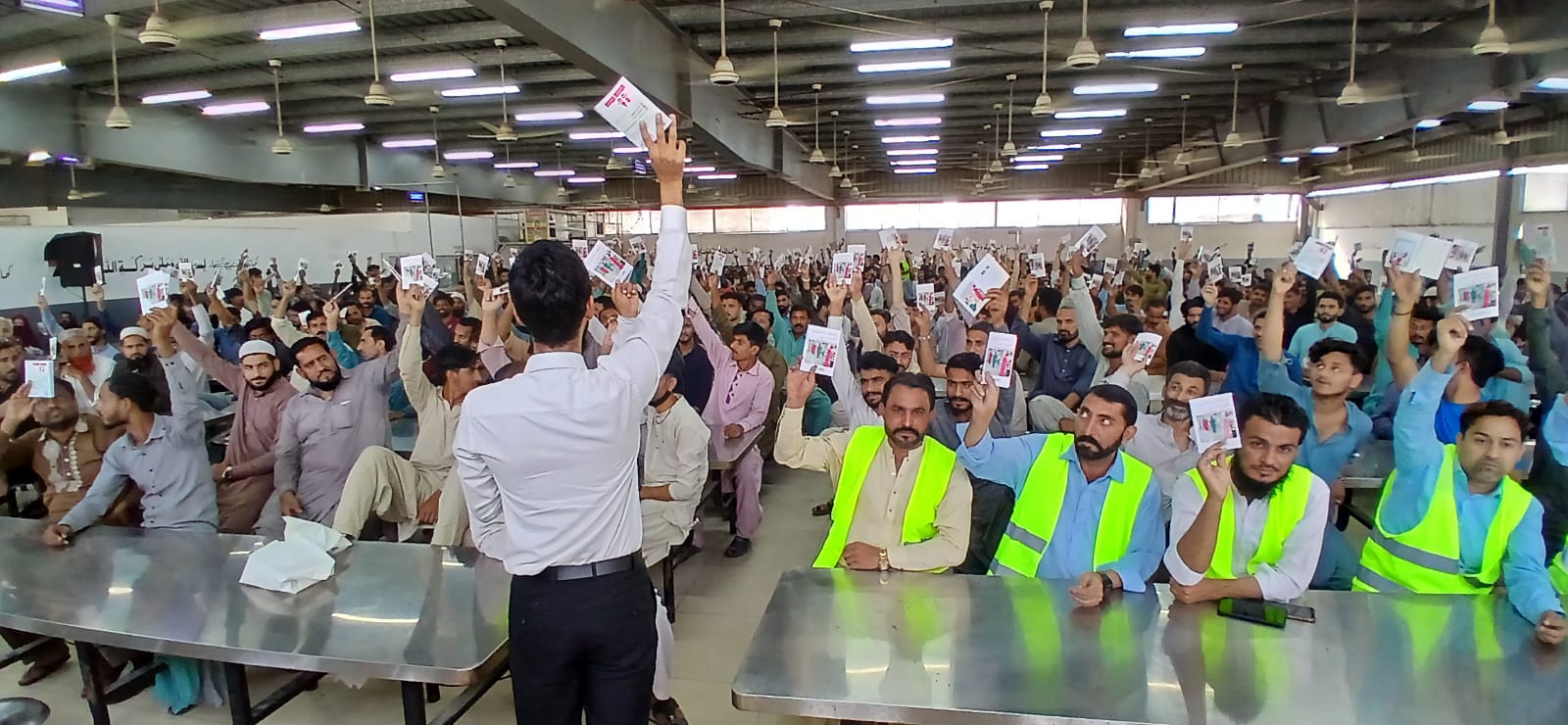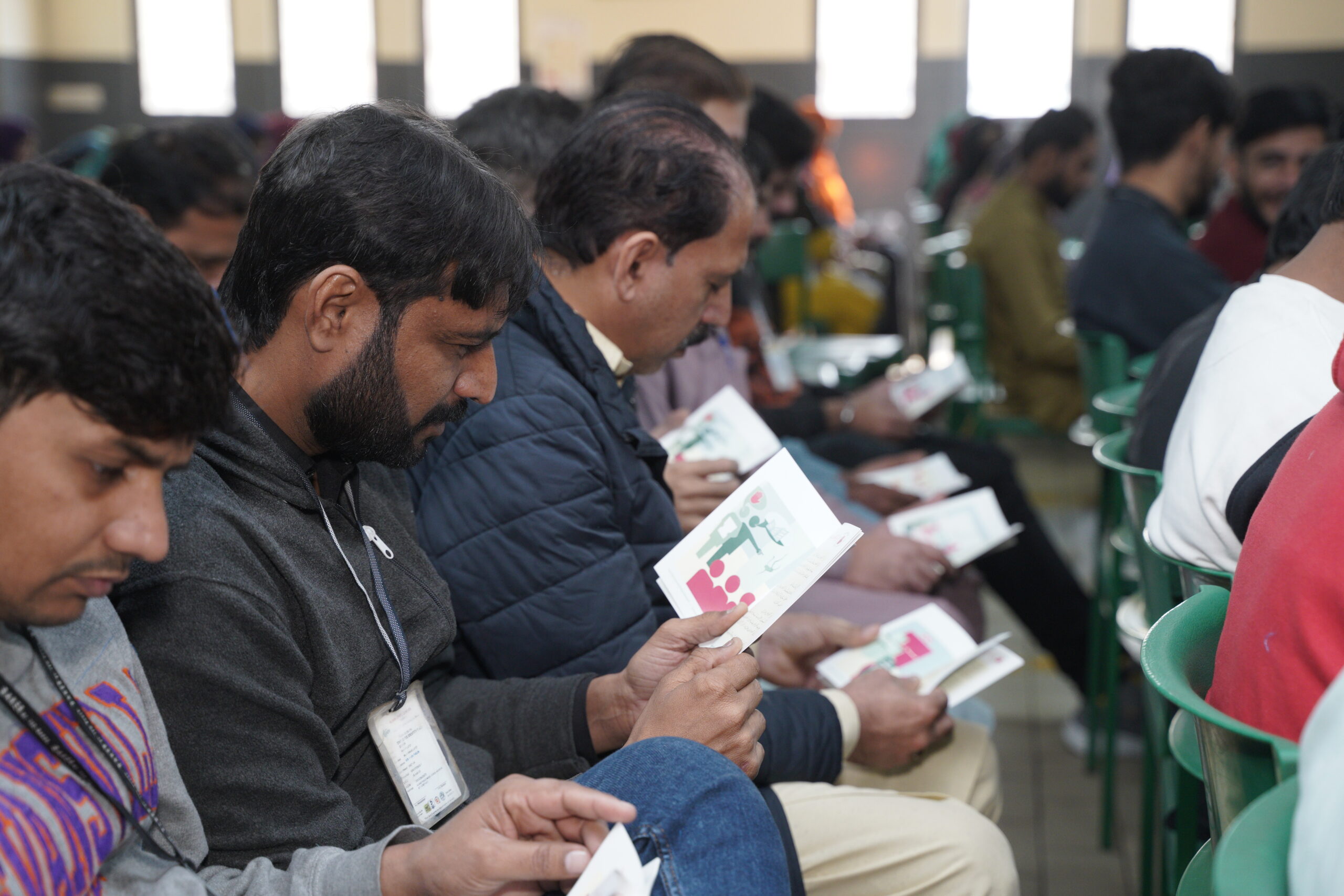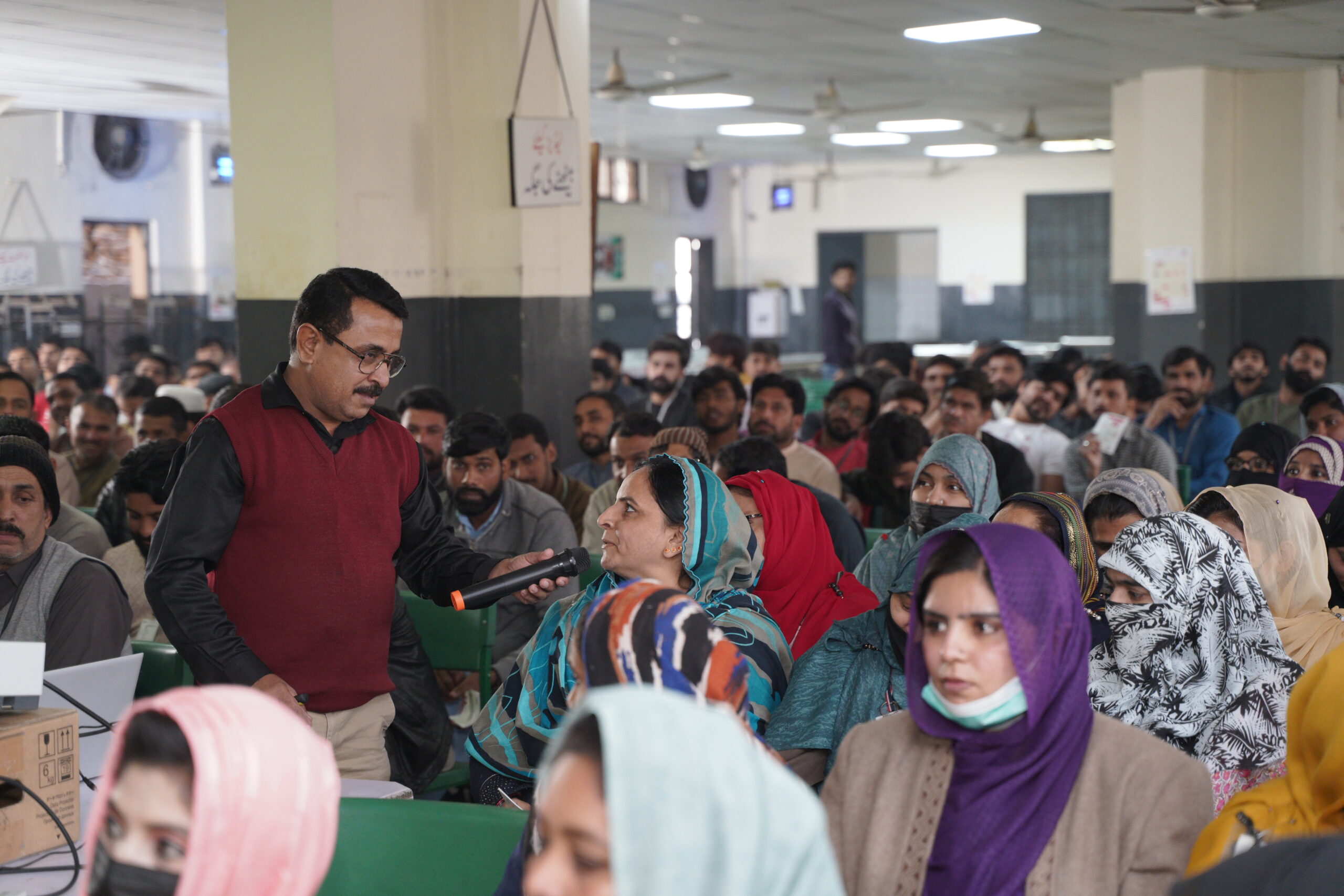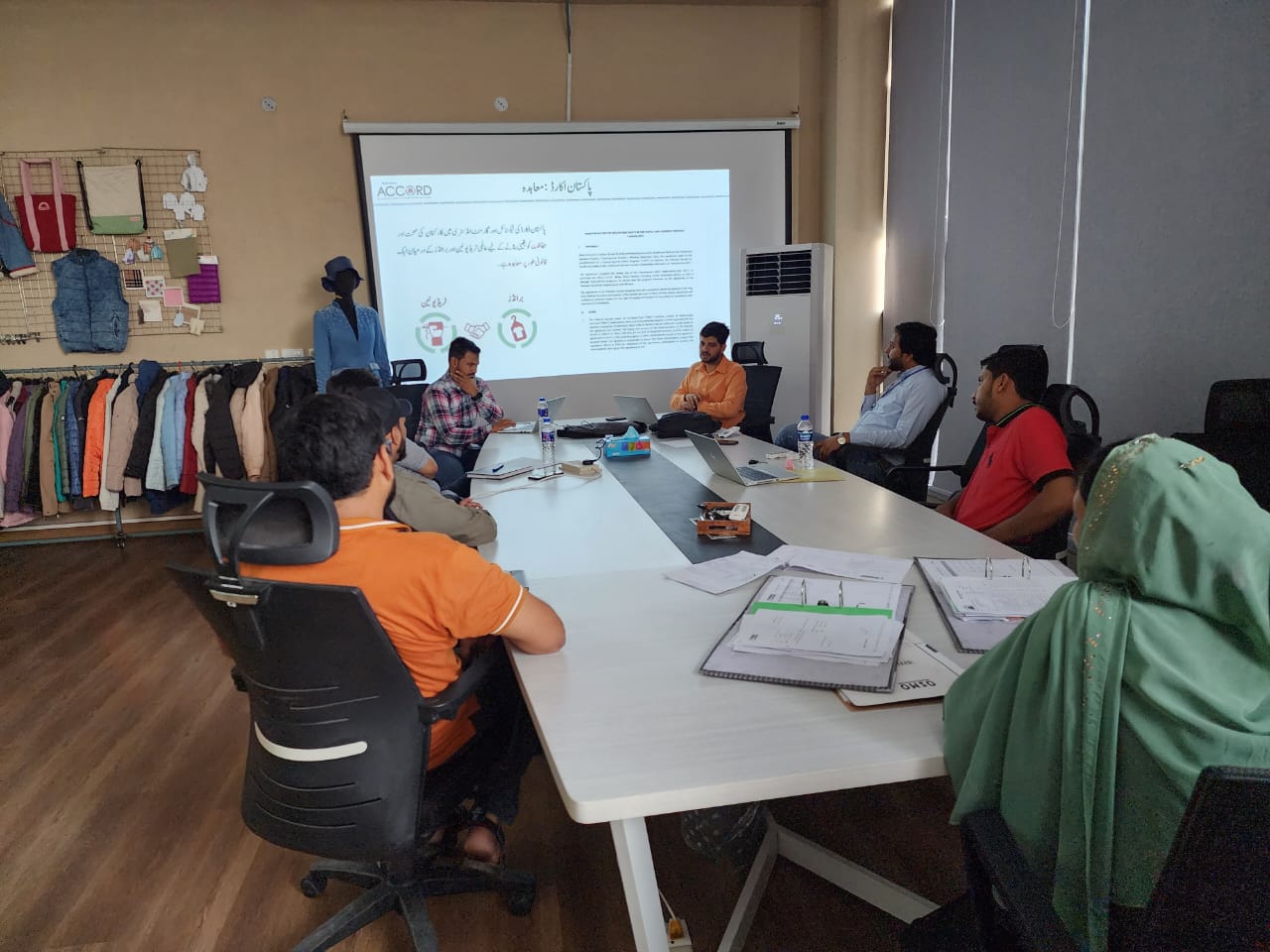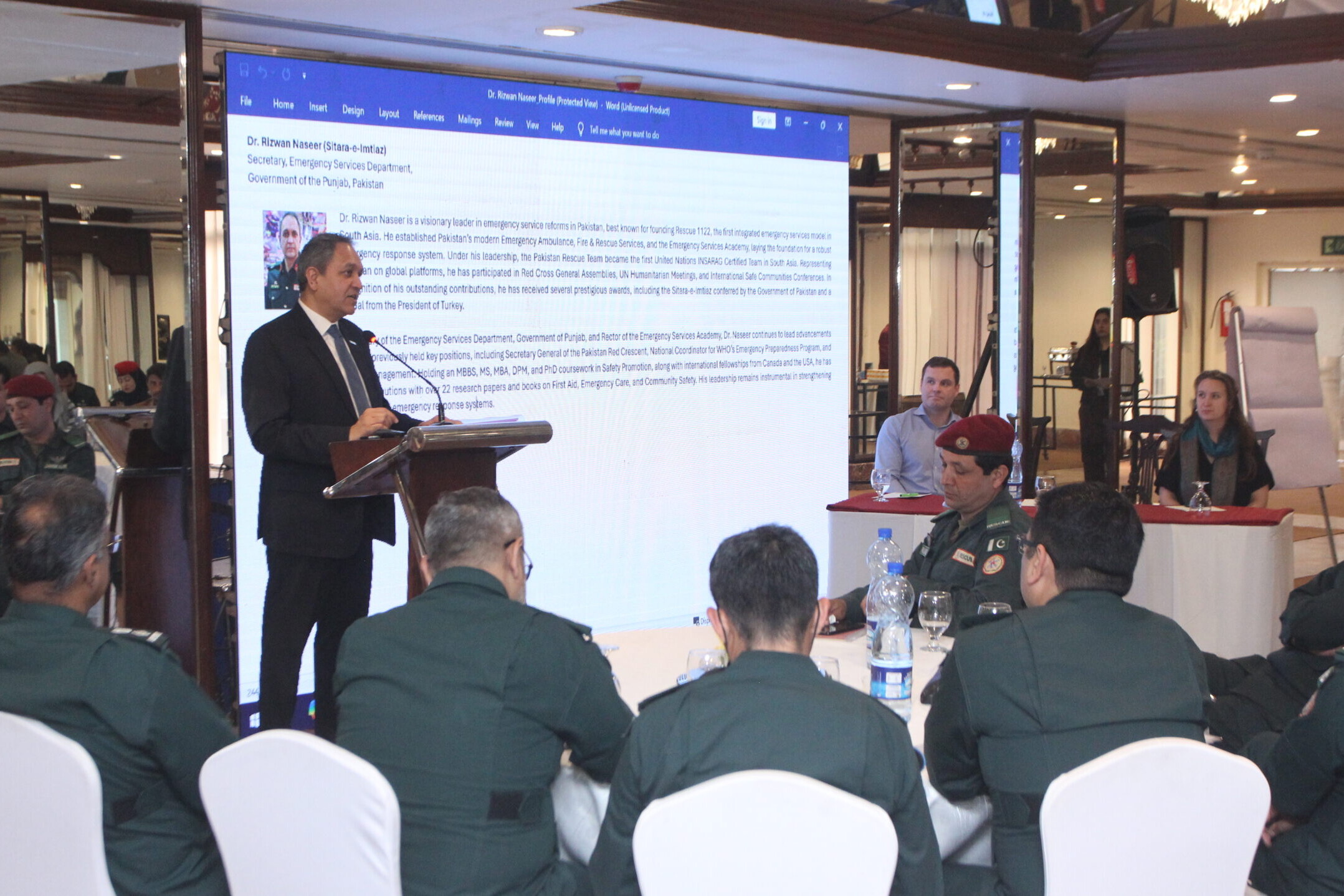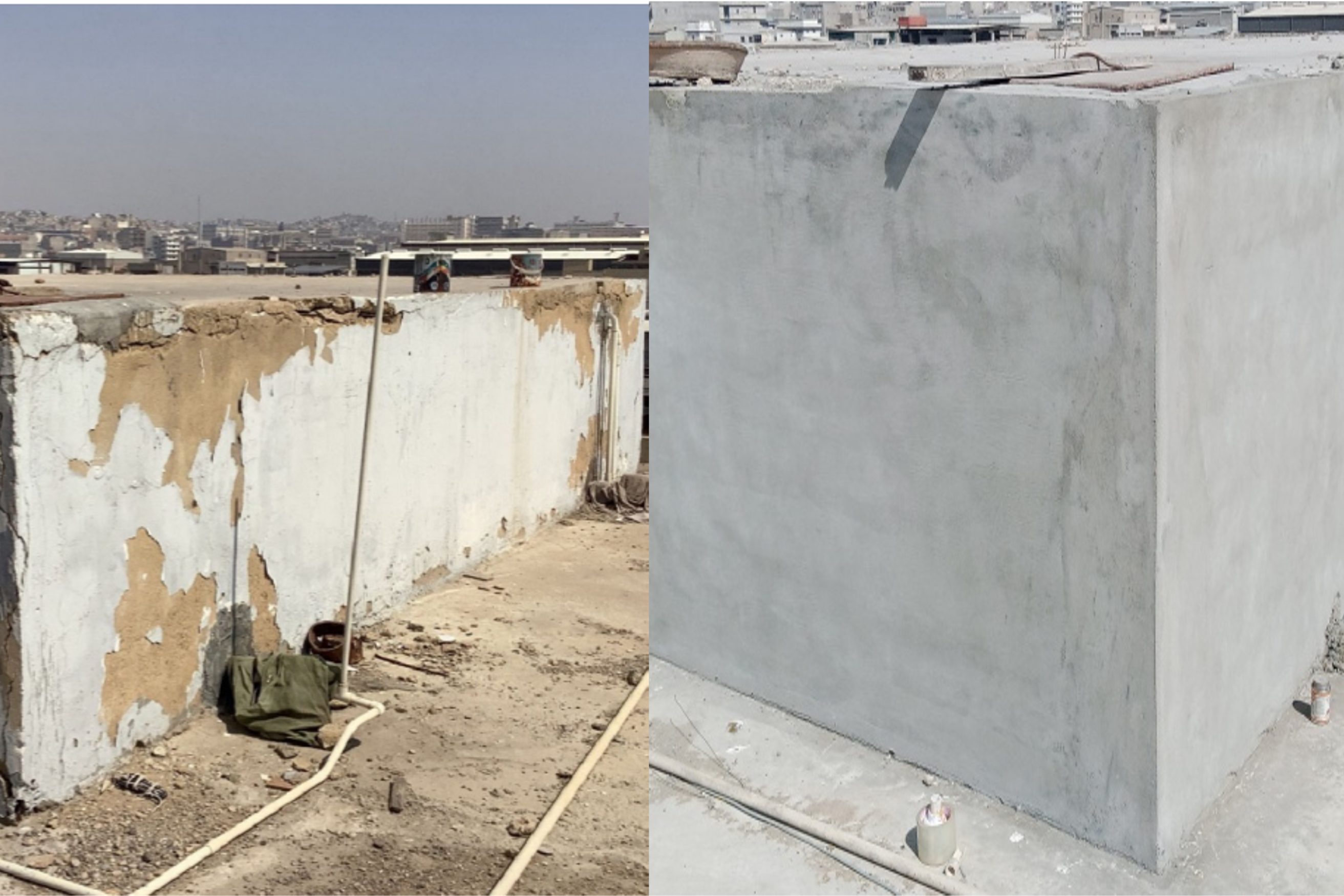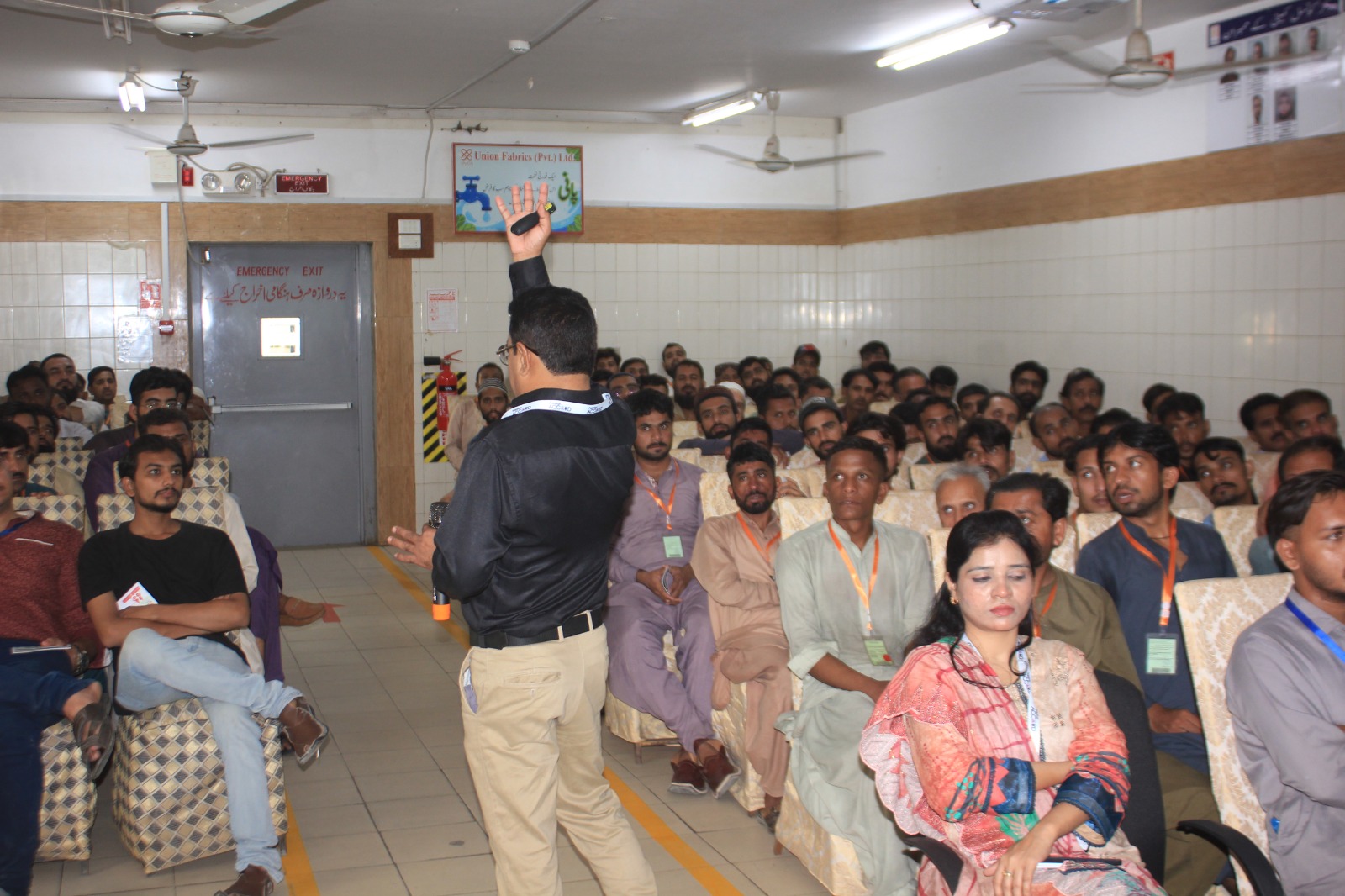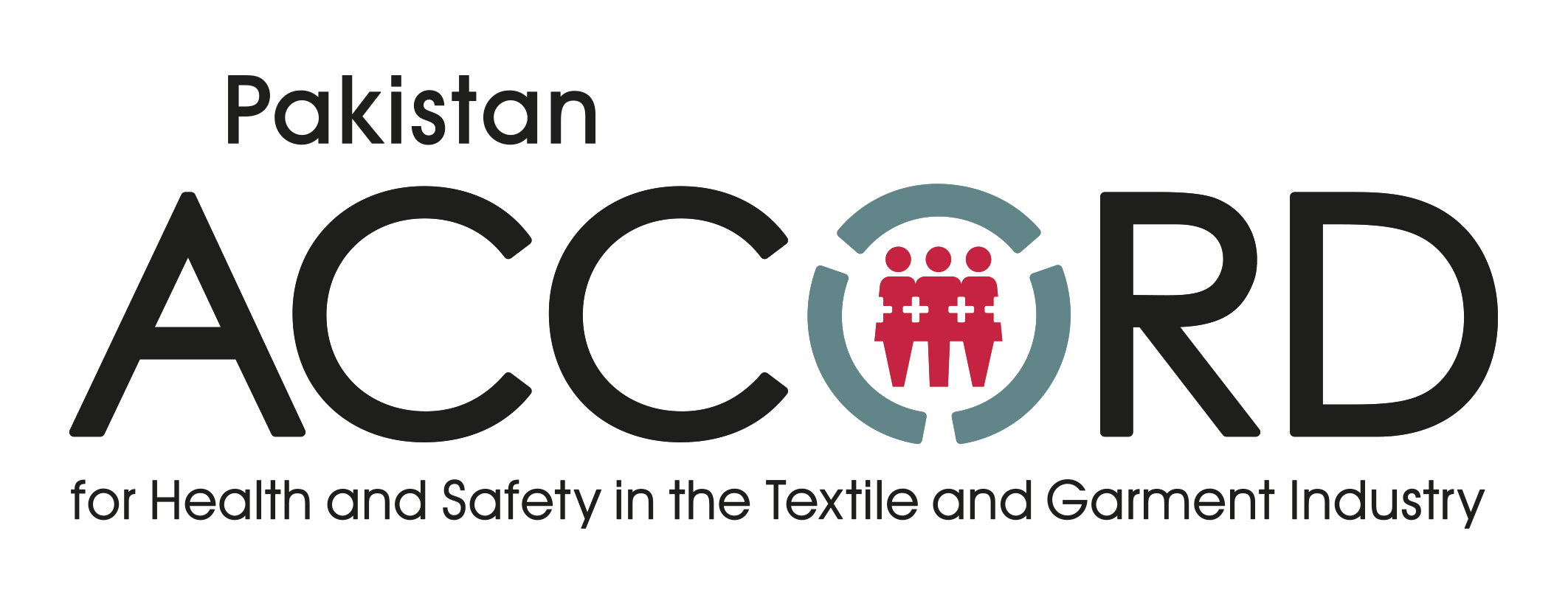

Supplier Briefing #8
These briefings are designed for all factories and suppliers listed by Pakistan Accord signatory brands. They include updates on key developments under the Pakistan Accord, along with information on upcoming events, guidance materials, and resources for suppliers.
We encourage all suppliers and factories covered by the Pakistan Accord to read these briefings and to share suggestions on what they would like to see in them by contacting us via pakistan.factories@internationalaccord.org.
This briefing includes updates on:
- Coverage: Signatory Brands, Factories and Workers
- Pakistan Accord Renewal & Role of Suppliers
- Program Rollout: Inspections & Remediation (Immediate Findings & Actions), Workplace Programs (Safety Training and Complaints Mechanism)
- Operations
Coverage: Signatory Brands, Covered Factories and Workers
At the time of writing this briefing, 142 global brands and retailers sourcing from Pakistan have signed the Pakistan Accord and have committed to ensuring workplace health and safety in collaboration with their sourcing partners. Since the last Supplier Briefing, Cotton On Australia, Essenza Home, Wolly & Co, and Genuine Collective have become signatories.
Signatory brands are headquartered in 18 countries across Europe, the USA, Australia, Hong Kong, Turkey and Japan, and include the world’s largest clothing brands and retailers. Collectively, these brands source over USD $3.5 billion worth of goods from 659 suppliers in Pakistan employing 706,408 workers.
View the latest list of Pakistan Accord signatories.
View the list of factories participating in the Pakistan Accord programs.
Pakistan Accord Renewal & Role of Suppliers
Negotiations are underway to extend the Pakistan Accord. As Accord representatives work toward renewal, factories are encouraged to continue advancing safety improvements at their facilities in collaboration with their appointed engineering consultants, signatory brands and the Pakistan Accord teams in Karachi and Lahore.
These efforts contribute to overall safety enhancements across Pakistan’s textile and garment industry and strengthen long-term business relationships with global brands and retailers.
Depending on their current stage in the remediation journey, the Pakistan Accord encourages factories to implement the following actions:
Pre-Inspection
- Onboarding Form: Submit administrative details and participation in the Pakistan Accord.
- Initial inspection Scheduling: Confirm time and date with the Pakistan Accord team.
- Pre-inspection Form: Submit all required documentation prior to the initial inspection.
- Pre-inspection Meeting: Understand the inspection and remediation process.
Remediation
- Engage a Qualified Engineering Consultant: Engage a consultant as soon as possible to begin remediation work following your Corrective Action Plan (CAP).
- Confirm Start and End Timings in your CAP:Work with your engineering consultant to review and agree on start and finish dates for each CAP finding. Any request for timeline adjustments must be justified by the consultant.
- Provide Regular Remediation Updates: Submit progress updates at least every four weeks. Your assigned Factory Remediation Coordinator (FRC) will also contact you every 28 days to request updates.
- Support Workplace Programs: Facilitate the rollout of Safety Training and the Complaints Mechanism within your factory.
Finance Planning
- Develop a Remediation Finance Plan: The Pakistan Accord team will assist you in preparing a phased Remediation Finance Plan covering the course of your remediation journey. This plan will provide your factory with financial visibility and prevent remediation delays.
- CAP Tool: A dedicated tool will be made available to assess the investments required to complete remediation measures outlined in your CAP.
The Pakistan Accord team is available to provide general guidance and support on CAP development. Factories are encouraged to work closely with their consulting engineers to ensure the effective implementation of remediation measures and Workplace Programs. Without the involvement of a qualified engineer, a factory will be unable to carry out its CAP.
The Pakistan Accord will organise workshops in the near future for factories and engineers to strengthen technical knowledge and build deeper engineering capacity.
Program Rollout
Inspections and Remediation
To date, over 300 factories across Karachi, Lahore, Sialkot, Multan, and Faisalabad have been inspected for fire, electrical and structural safety.
Immediate Findings
Recent factory fires in Pakistan and Bangladesh, including the tragic incident in Mirpur, Dhaka, which claimed at least 16 workers’ lives, underscore the devastating human cost of inadequate safety measures.
There are several immediate actions factories can take to significantly ensure worker safety, particularly to ensure rapid evacuation in the event of a fire:
Lockable Exits/Collapsible Gates: Remove all locks and mechanisms including bolts and hasps, from exit doors. If locks are necessary for security, use specialised door locking features that comply with NFPA 101.
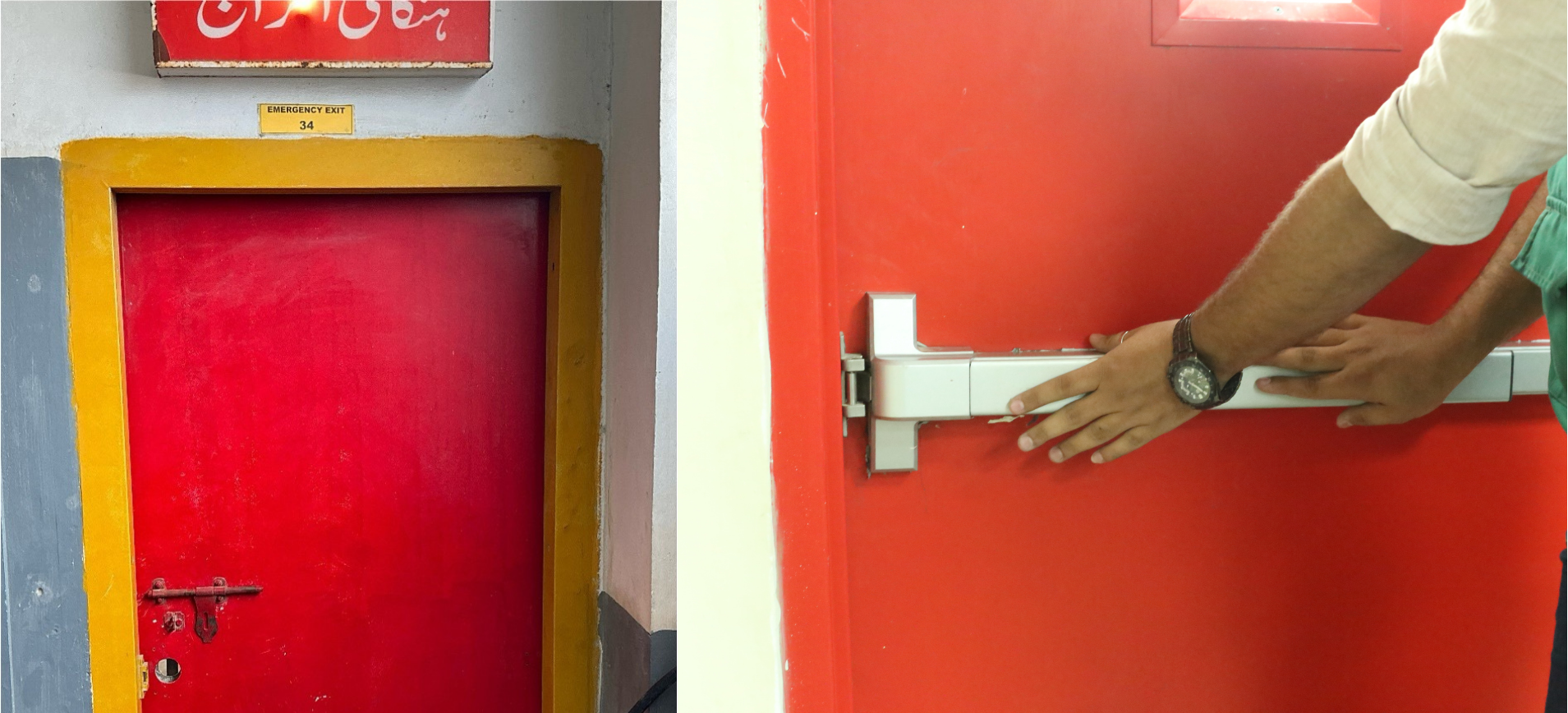
Left – Hazard: Locked fire exit; Right – Control: Unlocked, self-closing fire exit
Storage in Egress Paths, Exit Stairs & Dining Areas: Implement management systems to keep all egress routes, stairs, and dining areas clear of storage at all times. Stairs must always remain protected and unobstructed.
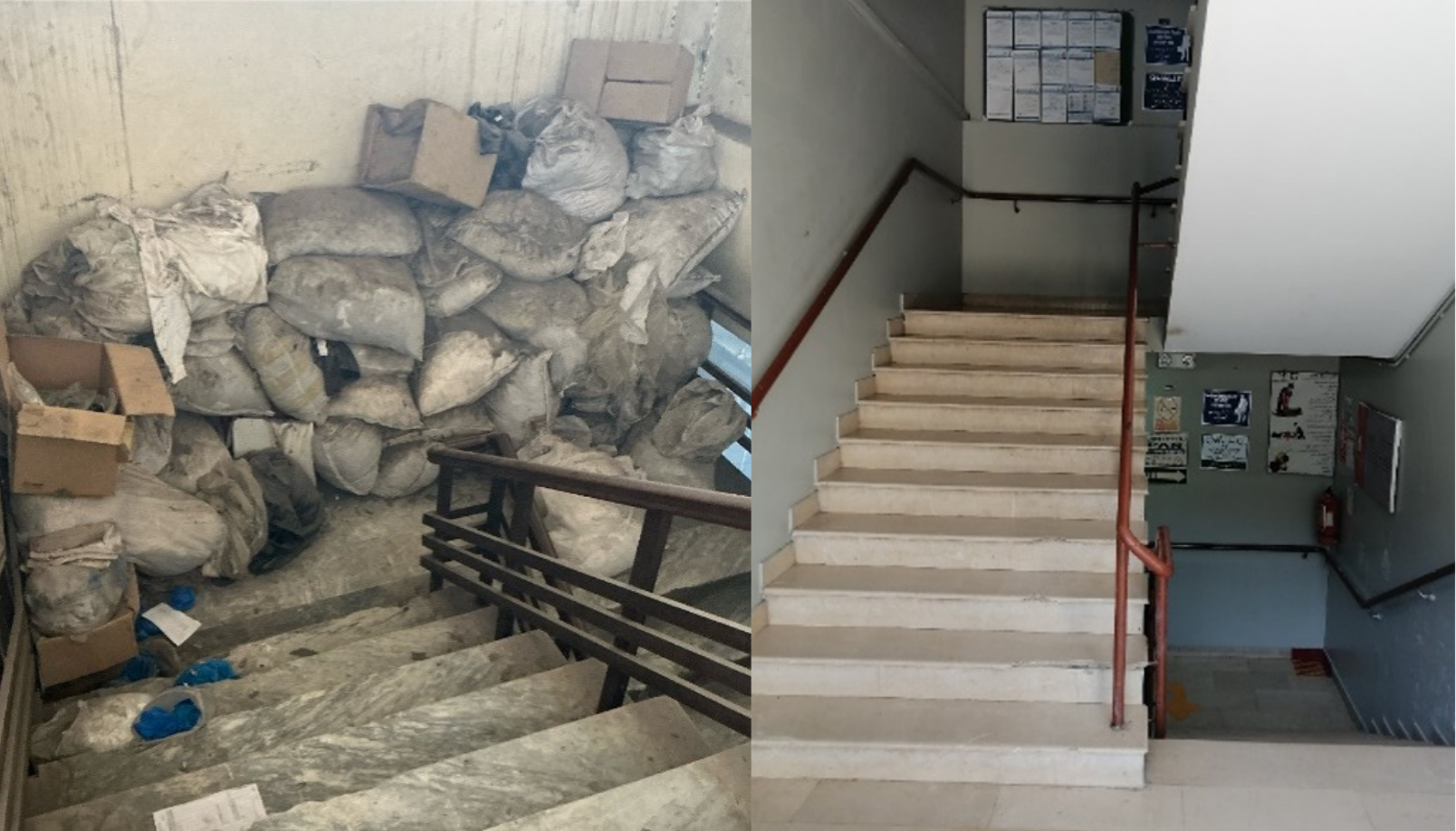
Left – Hazard: Blocked/narrowed evacuation route; Right – Control: Clear exit route
Stair & Occupant Load Signs: Provide stair designation signs and occupant load signs at the required locations. For stairs that do not lead outside the building, further modifications may be required to qualify as a means of egress. Guidance will be in your CAP or developed by your appointed engineering consultants.
Inadequate Exit Capacity: Specify stair locations, discharge floors, arrangements for discharge to grade, and openings on discharge floors (storage, production, etc.)
Cracked Columns: Have your consulting engineers, witnessed by Pakistan Accord engineers, assess any cracked structural columns.
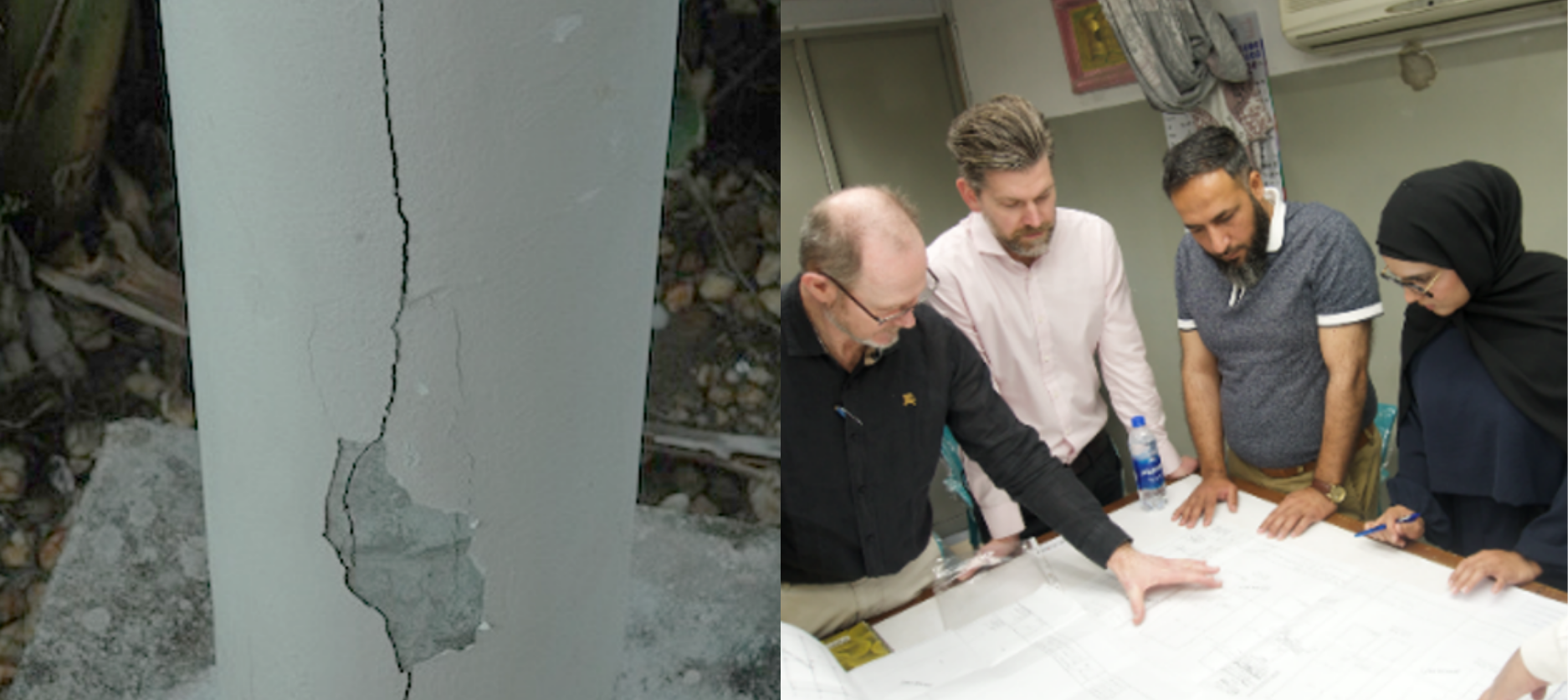
Left – Hazard: Crumbling columns/cracks; Right – Control: Building maintenance & structural safety assessment
Hot Spots: Inspect electrical load conditions, panel locations, and probable causes of high temperatures. If temperatures are excessive, circuit breakers must be immediately shut down.
Storage of Raw Materials and Finished Goods: Keep all materials away from work areas and heat sources. Order raw materials only as necessary and expedite delivery of finished goods to customers. All items must be kept clear of ignition sources, particularly electrical equipment or heat-producing machinery.
Do not delay addressing these fundamental life-saving measures. For any questions or support, contact the Pakistan Accord engineering team.
In addition to these measures, fire detection systems have important life-saving value as they alert occupants to the presence of a fire and allow them to evacuate safety. Factories without adequate detection systems should post security or other personnel as a temporary “fire watch” to ensure early detection. This in turn will facilitate prompt evacuation of the building before a fire develops.
Sprinkler systems provide a significant life-saving measure and are essential in multiple scenarios depending on the height of the building or large open production floors with extended travel distances. Sprinklers are also a cost-effective remediation measure. Consult your CAP or the Pakistan Accord team for further guidance.
Both fire detection and sprinkler systems, including fire pumps, water reservoirs, and standpipe systems, are complex installations requiring detailed technical design, engineering calculations, professional expertise and investments. Factories should discuss these systems with their engineering consultants as soon as possible.
Guidance for Factory Engineering Consultants
At the request of covered suppliers, the Pakistan Accord has developed guidance to support factories engage qualified engineering professionals for assessments and remediation under their CAPs. View the guidance document here.
The guidance supports factories in meeting the Pakistan Accord Building Standard, ensuring consultants have the qualifications, expertise, and integrity to deliver safe, code-compliant, high-quality engineering services aligned with the safety improvements at factories.
Important: The Pakistan Accord does not accredit or endorse any external consultants. Factories should not hire any outside parties claiming to represent or provide services on behalf of the Pakistan Accord.
Workplace Programs
The Pakistan Accord has made substantial progress in implementing its Workplace Programs across covered factories, directly reaching 108,358 workers. As of 30 September 2025, 234 initial meetings had been completed, and All Employee Meetings were conducted at 98 factories across a total of 454 sessions.
In addition, 26 Safety Committee meetings have been organised with 310 participants. These joint labour-management committees play a vital role in strengthening workplace health and safety systems for workers across covered factories.
The Pakistan Accord’s Workplace Programs will continue rolling out across all covered factories
The Pakistan Accord Complaints Mechanism has received 167 complaints, with the most common issues including heat stress (drinking water quality and temperature), workplace injuries or deaths and lack of provision of personal protective equipment (PPE).
The Workplace Programs will continue to roll out the Safety Committee Training Program and schedule additional initial and All-Employee Meetings in the coming months.
Operations
The Pakistan Accord is building and training local teams in Karachi and Lahore to ensure effective program implementation. Recruitment is ongoing for:
- Fire, structural, electrical, and boiler safety experts
- Training and complaints specialists
- Additional support staff
Resources
Stay in Touch
Related updates
February 19, 2025
The Pakistan Accord team recently organised a series of capacity building workshops for government officials in the Sindh and Punjab provinces.
February 18, 2025
Factories in Pakistan have begun addressing key safety findings and are implementing improvements at their facilities.
November 28, 2024
On 26 and 27 November 2024 the Pakistan Accord conducted its inaugural safety training meeting in Pakistan. The meeting was attended by all employees of the factory.
November 28, 2024
On 26 and 27 November 2024 the Pakistan Accord conducted its inaugural safety training meeting in Pakistan. The meeting was attended by all employees of the factory.
August 21, 2024
The Pakistan Accord Secretariat hosted a briefing on the rollout of Workplace Programs on August 19, 2024, in Karachi.
August 8, 2024
In view of the complex political situation in Bangladesh, the International Accord makes the following statement in solidarity with the people of Bangladesh.

